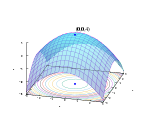Humanoid Ant algorithm
This article may be too technical for most readers to understand. (January 2023) |
The Humanoid Ant algorithm (HUMANT) [1] is an ant colony optimization algorithm. The algorithm is based on a priori approach to multi-objective optimization (MOO), which means that it integrates decision-makers preferences into optimization process.[2] Using decision-makers preferences, it actually turns multi-objective problem into single-objective. It is a process called scalarization of a multi-objective problem.[3] The first Multi-Objective Ant Colony Optimization (MOACO) algorithm was published in 2001,[4] but it was based on a posteriori approach to MOO.
The idea of using the preference ranking organization method for enrichment evaluation to integrate decision-makers preferences into MOACO algorithm was born in 2009.[5] HUMANT is the only known fully operational optimization algorithm that successfully integrates PROMETHEE method into ACO.[6]
The HUMANT algorithm has been experimentally tested on the traveling salesman problem and applied to the partner selection problem with up to four objectives (criteria).[7]
References[edit]
- ^ Mladineo, Marko; Veza, Ivica; Gjeldum, Nikola (2015). "Single-Objective and Multi-Objective Optimization using the HUMANT algorithm". Croatian Operational Research Review. 6 (2): 459–473. doi:10.17535/crorr.2015.0035.
- ^ Talbi, El-Ghazali (2009). Metaheuristics – From Design to Implementation. John Wiley & Sons.
- ^ Eppe, Stefan (2009). "Application of the Ant Colony Optimization Metaheuristic to multi-objective optimization problems". Technical Report – ULB, Bruxelles.
- ^ Iredi, Steffen; Merkle, Daniel; Middendorf, Martin (2001). "Bi-Criterion Optimization with Multi Colony Ant Algorithms". Evolutionary Multi-Criterion Optimization. Lecture Notes in Computer Science. 1993: 359–372. doi:10.1007/3-540-44719-9_25. ISBN 978-3-540-41745-3.
- ^ Eppe, Stefan (2009). "Integrating the decision maker's preferences into Multi Objective Ant Colony Optimization". Proceedings of the 2nd Doctoral Symposium on.
- ^ Al-Janabi, Rana JumaaSarih; Al-Jubouri, Ali Najam Mahawash (2022), "Multi-key Encryption Based on RSA and Block Segmentation", Biologically Inspired Techniques in Many Criteria Decision Making, Singapore: Springer Nature Singapore, pp. 687–695, ISBN 978-981-16-8738-9, retrieved 2023-11-03
- ^ Mladineo, Marko; Veza, Ivica; Gjeldum, Nikola (2017). "Solving partner selection problem in cyber-physical production networks using the HUMANT algorithm". International Journal of Production Research. 55 (9): 2506–2521. doi:10.1080/00207543.2016.1234084.
This article needs additional or more specific categories. (January 2023) |

